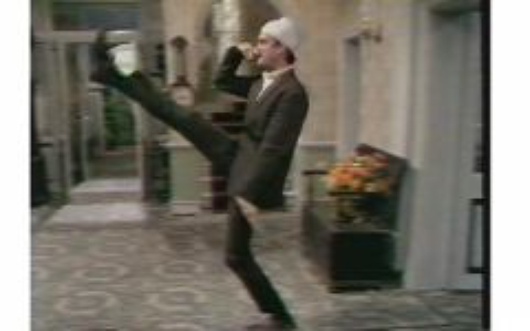Mentioning the Second World War is no laughing matter… except in Britain
Published on
The UKIP MEP Godfrey Bloom was yesterday expelled from the European Parliament. In a debate on the current Iris bailout, he marked his opposition to the speech of German MEP Martin Schultz (leader of the European social democrats) with the jibe “Ein volk, ein Reich, ein fuhrer” (one people, one empire, one guide, the slogan of Nazi Germany).
 Martin Schultz bewildered as he hears Bloom’s outburst (video)
Martin Schultz bewildered as he hears Bloom’s outburst (video)
A stunned Parliament demanded for Bloom to leave and the EP President asked him to do so after he refused to apologise. This episode exemplifies one of the most whimsical cultural differences between Britain and continental Europe. In the British cultural microclimate, Nazi slurs and Nazi jokes are much more common than on the Continent. The specific British approach to the war has barely changed since the illustrious “Germans” episode from Fawlty Towers where the hotel manager Basil Fawtly (John Cleese) just cannot help mentioning the Second World War to his German guests.
 “Don’t mention the war! I mentioned it once but I think I got away with it”
“Don’t mention the war! I mentioned it once but I think I got away with it”
On the Continent, the Second World War and Nazi Germany are no laughing matters. The Nazi insult is barely used. Politicians and activists looking for a synonym for “anti-democratic”, will use the words “fascist” or “dictatorial”. The word “Nazi” is linked with racism and mass murder and for this reason it is left aside from conventional political jostling and casual jokes. On the contrary, “Nazi” is often used as a hyperbole for “anti-democratic” in Britain.
Beyond these linguistic subtleties, there is overall a different approach in Britain and on the Continent about the war. Continentals have worked hard to put the war behind them. Whilst they agree that there is a “duty to remember”, it is in the sense of a family drama every body wants to put behind. On the contrary, few kilometres across the Channel, the war is still very much pervasive in the national psyche. Far from trying to put the war behind, it seems that remembering the glory of beating the Nazy has become a building bloc of British national identity. It is on this subject that Deputy PM Nick Clegg said once that Britain had a “tenacious obsession with the last war”.
Only such a cultural divide over the war can explain how a British MEP can fail to foresee that such a comment made in the European Parliament and addressed to a democratically elected German MEP is only going to provoke bewilderment and anger from continental MEPs.



